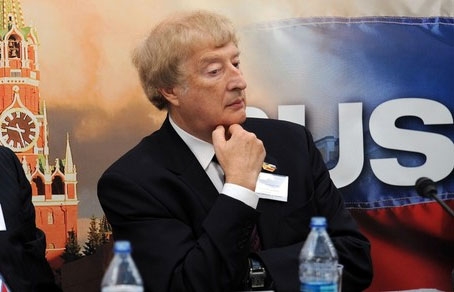
 It looks like some members of U.S. Congress have little to worry about except inventing ever harsher penalties for Russia. The United States' real problems — such as the national debt approaching $17 trillion, the bankruptcy of Detroit, racial unrest, the widening gap between the wealthy and poor and a shrinking middle class, and the latest row over National Security Agency global spying — seem at times to be eclipsed by Russia's human rights record, its stand on Syria and Edward Snowden's asylum in Sheremetyevo Airport.
It looks like some members of U.S. Congress have little to worry about except inventing ever harsher penalties for Russia. The United States' real problems — such as the national debt approaching $17 trillion, the bankruptcy of Detroit, racial unrest, the widening gap between the wealthy and poor and a shrinking middle class, and the latest row over National Security Agency global spying — seem at times to be eclipsed by Russia's human rights record, its stand on Syria and Edward Snowden's asylum in Sheremetyevo Airport.All of that looks pretty ludicrous. Political analysts and pundits keep saying that Russia's weight in international affairs is minuscule and that China is far more important for Washington.
While U.S. lawmakers actively criticize Russia on the House and Senate floors, there are few congressional hearings on China's democracy.
Does this mean that China's one-party Communist system is more appealing to the U.S. legislators and media than Russia's developing democracy? Clearly there is another factor at play: the existence of a powerful anti-Russia lobby in Washington.
For example, the lobby has convinced Senator Charles Schumer, a Democrat, and Senator Lindsey Graham, a Republican, to sponsor a resolution to shift the G20 Summit in St. Petersburg to another venue if Russia grants asylum to Snowden. Graham has also called for a boycott of the Olympic Games in Sochi.
These proposals are echoed in the media. For example, several editorials in The Washington Post have accused U.S. President Barack Obama for his spineless Russia policy and demand outright that anti-Putin rhetoric be toughened. Thus, there is much suspense as to whether Obama will make his trip to Moscow or even to St. Petersburg. Obama is in for a serious test to prove his ability to stand up to the anti-Russia lobby.
Ironically, Republicans have given Obama more support on Russia than Democrats have.
Republican Representative Dana Rohrabacher, who was a speech writer for former U.S. President Ronald Reagan, has called on his colleagues to stop confusing Russia with the Soviet Union and take into account all the vital changes for the better the country has witnessed since the collapse of communism.
The institute named after Ron Paul, the Republican candidate in the 2012 presidential race, issued a statement by its executive director Daniel McAdams stressing the absurdity of the call to boycott the Sochi Olympics.
"The original U.S. boycott of the 1980 Summer Olympics [in Moscow] was meant to embarrass the Soviet Union for its 1979 invasion of Afghanistan. The U.S., of course, went on to arm and train the Afghan mujahedeen to drive the Soviets out. After this, the mujahedeen set up an Islamic state, gave refuge to bin Laden and al-Qaida, were implicitly an accessory to the 9/11 attacks, were then invaded by the U.S. [in 2001], fought a 12 year war, and finally are poised to take over again as the U.S. desperately seeks to sue for peace while exiting as quickly as possible," McAdams writes.
It is Russia that not only helped the U.S. more than any other country to defeat the Taliban at the beginning of this war, but it is instrumental right now in minimizing U.S. human and material losses as the war winds down.
If U.S. public opinion has any meaning, the Kremlin's behavior may not look so horrible. Just like the Russians, most Americans are against a direct U.S. military role in the Syrian conflict or arming the Syrian opposition. What's more, roughly 40 percent of Americans approve of what Snowden has done.
The argument that undermines the anti-Russian position the most boils down to this: Who are the Americans to tell others how they should live, particularly when their own system is so inadequate? They should put their own house in order first before carping on Russian deficiencies.
Notably, the approval ratings for the U.S. Congress have for the last several years stayed below 10 percent. The overwhelming majority of Americans believe that members of Congress fail to fulfill their proper functions. It is unlikely that raging and fuming against Putin will help increase their popularity.



.jpg/250px-ElbeDay1945_(NARA_ww2-121).jpg)





